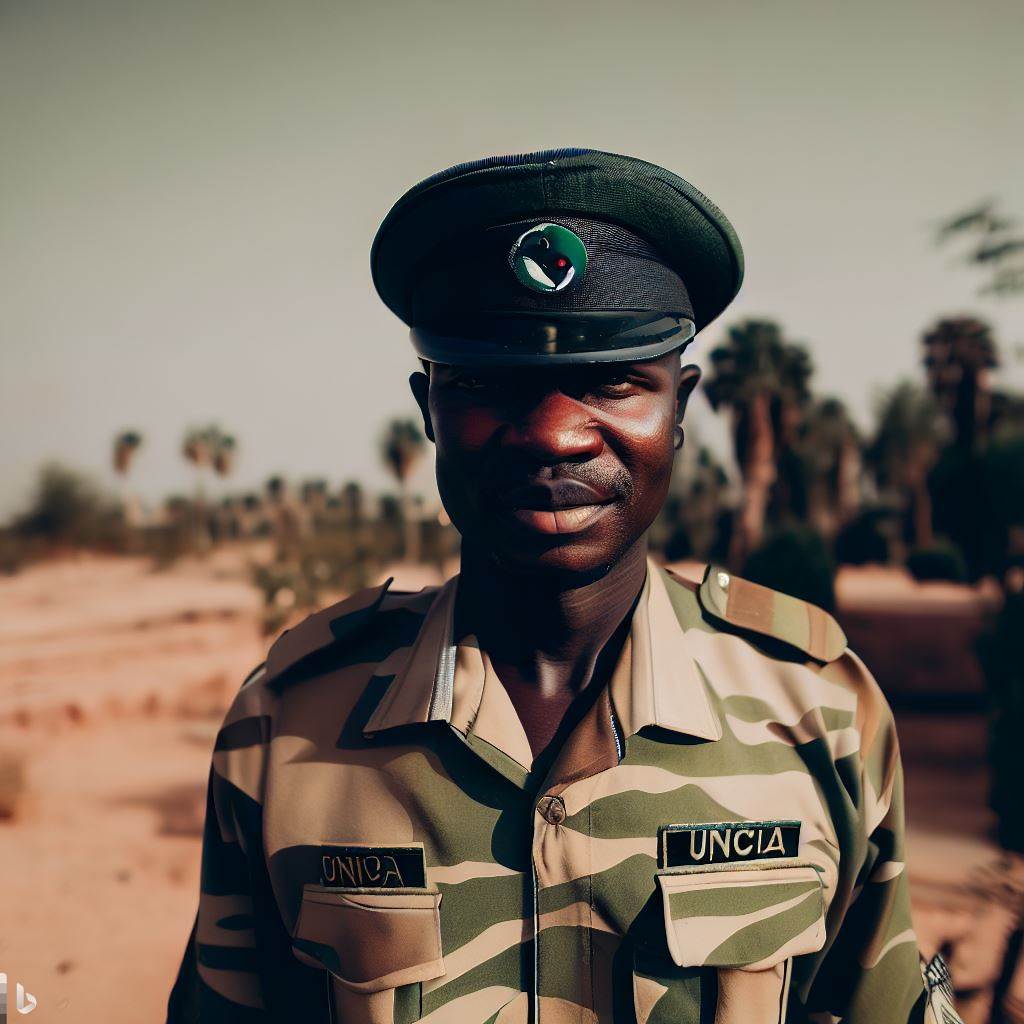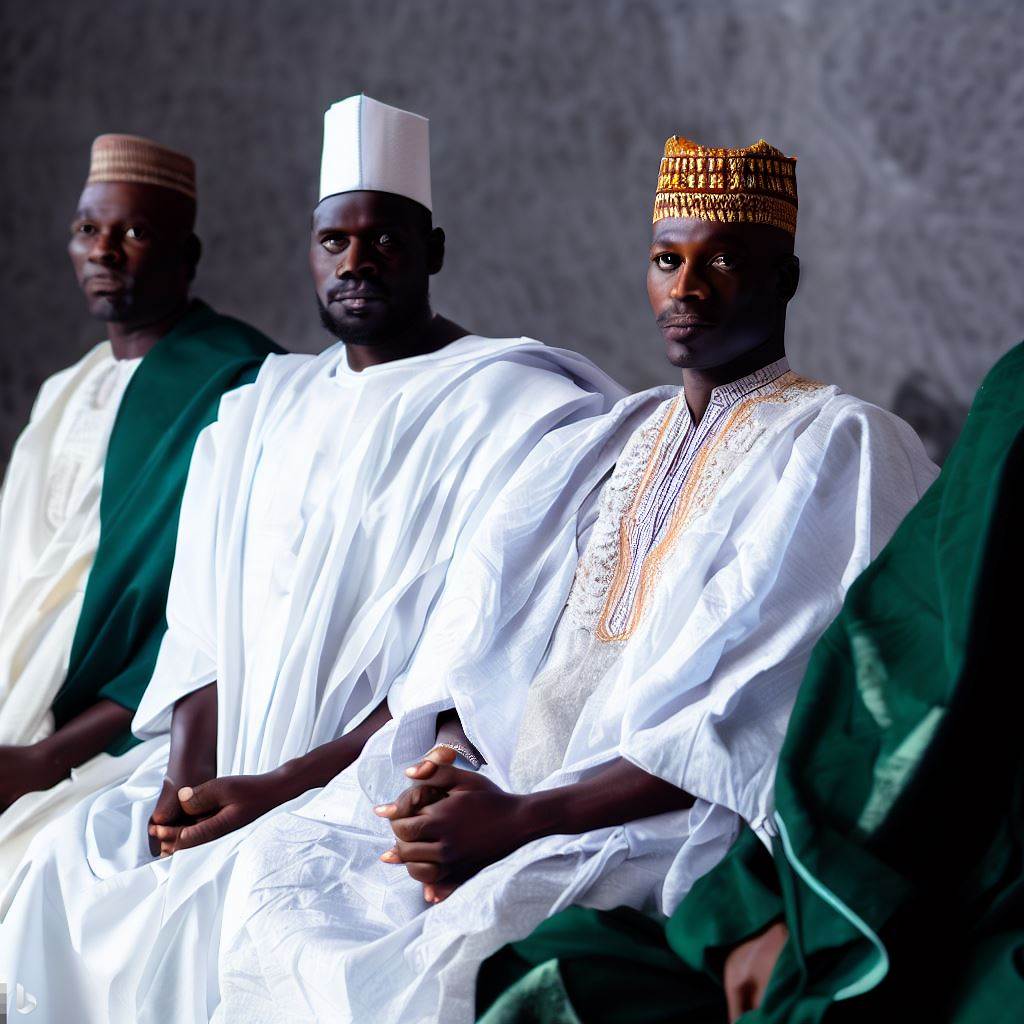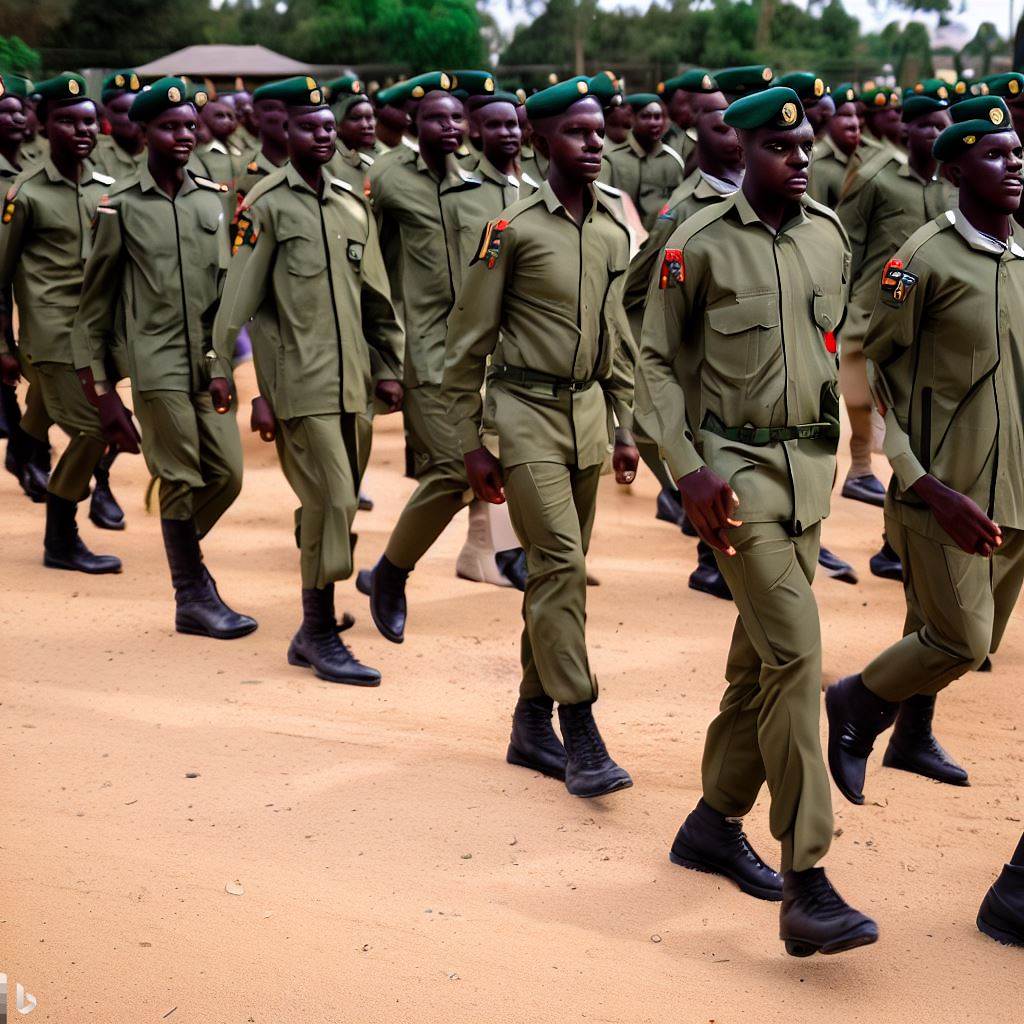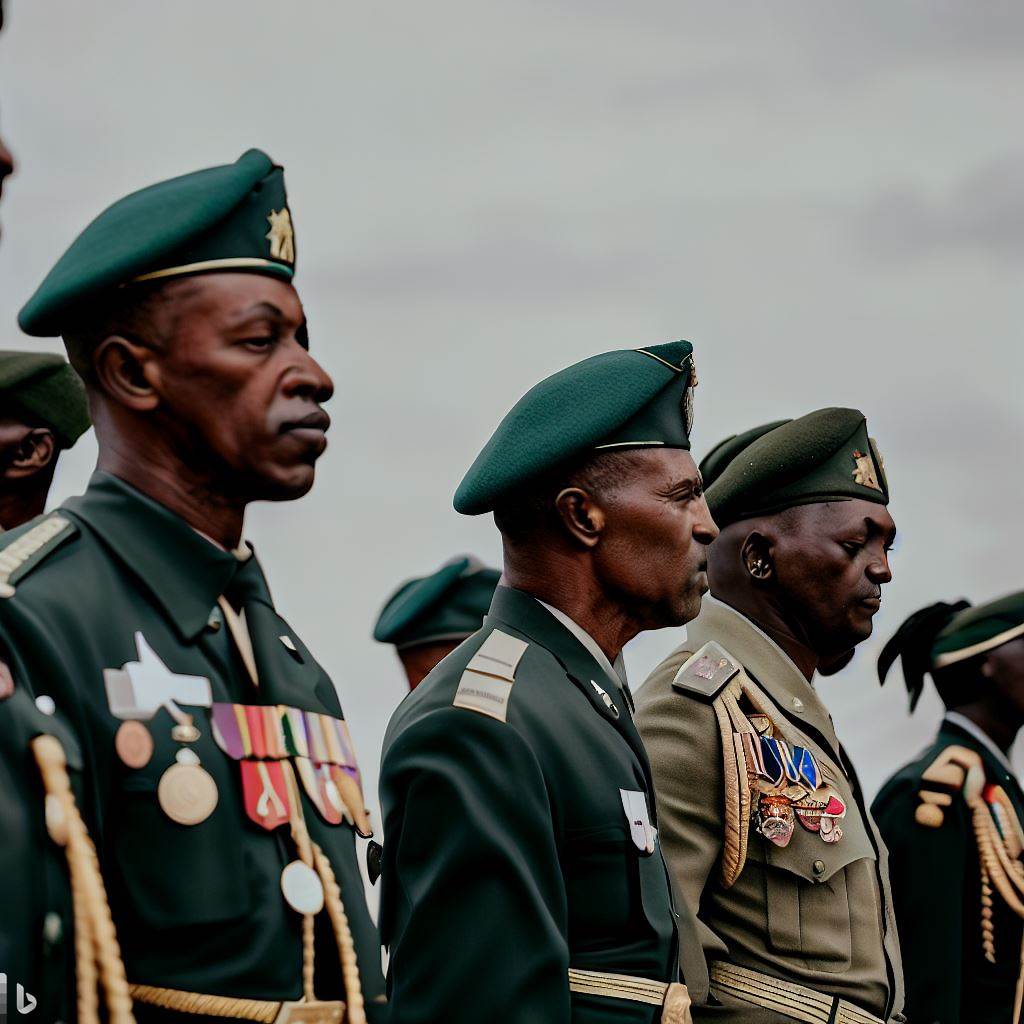Introduction
Peacekeeping missions refer to international interventions by the military to prevent or resolve conflict situations in regions affected by war, strife, or violence.
In Nigeria, peacekeeping missions have been significant in stabilizing the country’s political climate, promoting diplomatic relations, and restoring social order.
This blog post will discuss the significant role played by the military in Nigeria’s peacekeeping missions.
Thesis statement
Nigeria’s peacekeeping missions have required the deployment of military personnel to neutralize conflicts, create a secure environment, and facilitate peace negotiations.
The military’s contribution to peacekeeping missions in Nigeria has been vital in restoring peace and stability to conflict-torn regions.
Read: Exploring the Organizational Structure of the Nigerian Government
Brief History of Nigeria’s Peacekeeping Missions
Nigeria’s history includes extensive participation in peacekeeping missions within Africa and beyond, promoting peace and stability.
- Nigeria joined the UN Operation in Congo in the 1960s, marking the beginning of its involvement.
- It played significant roles in peacekeeping missions, including Sierra Leone, Liberia, Sudan, and Mali.
- In Sierra Leone, Nigerian troops disarmed rebels, preventing further violence and restoring democratic rule.
- In Liberia, Nigeria contributed troops to ECOMOG, preventing chaos during the civil war.
- Nigerian troops participated in UNMIS, ensuring stability during the Darfur conflict.
- In Somalia, they were part of AMISOM, countering the threat of Al-Shabaab.
- Nigerian soldiers promoted peace, security, and stability, disarming combatants and protecting civilians.
Nigeria’s military played a crucial role in peacekeeping missions, restoring democratic governance and providing humanitarian assistance.
Their commitment demonstrates the country’s dedication to promoting peace within the region and beyond.
Read: Challenges and Triumphs: The Nigerian Military Story
The Importance of Peacekeeping Missions
Peacekeeping missions are crucial not only to the country involved but to the global community as well.
Nigeria, as a member of the United Nations, has played a significant role in numerous peacekeeping operations around the world.
These missions serve as a tool to counteract conflicts and promote peace and stability in regions affected by civil war, political crises, and other forms of violence.
The benefits of peacekeeping missions to Nigeria and the global community
For Nigeria, participating in peacekeeping missions benefits its international reputation, strengthens its military capabilities, and improves its diplomatic relations with other nations.
Additionally, Nigeria receives financial assistance and training from the United Nations to support its efforts in peacekeeping missions.
The global community also benefits from peacekeeping missions. These operations help prevent conflicts from escalating into regional or international crises.
Furthermore, peacekeeping missions are essential in stabilizing areas with a history of political instability and violence, promoting regional cooperation, and assisting in the democratization process of a country.
The challenges faced in peacekeeping missions
However, despite the benefits, peacekeeping missions are not without challenges.
One of the main obstacles is the security threats posed to the military and civilian personnel working in the conflict-affected region. Peacekeepers often face violent attacks from armed groups, which can harm or injure them severely.
Furthermore, peacekeeping missions face organizational challenges such as inadequate resources, lack of coordination among different mission components, and difficulties in achieving a consensus among the parties involved in the conflict. These challenges can lead to a delay in the process of resolving the conflict.
The need for effective management and coordination in peacekeeping missions
Effective management and coordination are crucial in peacekeeping missions to ensure the success of the operation.
The United Nations should provide adequate resources and training to the peacekeeping mission to allow it to operate at the highest possible level.
It should also ensure that there is a clear chain of command and communication among different mission components and that they work in harmony towards the same goal.
Moreover, the parties involved in the conflict should cooperate and be willing to seek a peaceful resolution to the issue.
This requires having an open dialogue towards finding a common ground and a willingness to compromise for the greater good.
Peacekeeping missions are critical in promoting peace and stability in regions affected by civil war, political crises, and other forms of violence.
Nigeria has played a significant role in numerous peacekeeping missions, benefiting both the country and the global community.
However, these missions are not without challenges, and effective management and coordination are essential in ensuring success.
Peacekeeping missions allow for the restoration of peace and security in a region, creating a conducive environment for social and economic development.
Read: Military Influence on Nigerian Politics: A Deep Dive
The Role of the Military in Nigerian Peacekeeping Missions
Peacekeeping missions around the world require the involvement of military forces.
In Nigeria, the military’s participation in peacekeeping missions has been significant, and this blog post highlights their roles, expertise, and training.
The Significance of the Military’s Involvement in Peacekeeping Missions
The Nigerian military’s involvement in peacekeeping missions is essential for maintaining peace and security in the region.
They provide vital support to UN, AU, and ECOWAS peacekeeping missions, essential trade and transportation routes, and oil installations.
What’s more, the Nigerian military’s involvement in peacekeeping missions has helped to enhance Nigeria’s reputation in the international community, which can have significant political and economic implications.
Peacekeeping missions offer the military an opportunity to showcase their capabilities and improve their expertise in various aspects of conflict management and resolution.
Military Training and Expertise Required for Peacekeeping Missions
Peacekeeping missions require specialized knowledge and training to manage different aspects of conflicts effectively.
Therefore, the military undergoes extensive training before being deployed to peacekeeping missions.
They receive training in conflict management and resolution, peacekeeping operations, civil-military cooperation, and international humanitarian law.
Training for peacekeeping missions also includes an emphasis on cultural sensitivity, language proficiency, and effective communication. These skills are essential in managing conflicts and building relationships with local communities.
Specific Roles Played by the Military in Peacekeeping Missions
The Nigerian military plays several essential roles in peacekeeping missions, including:
- Protection of Civilians: The Nigerian military provides security to civilians who are most affected by the conflict.
- Disarmament, Demobilization, and Reintegration: Nigerian military personnel help to disarm combatants, facilitate their transition to civilian life, and address the root causes of the conflict.
- Humanitarian Assistance: The Nigerian military provides essential services such as medical care and assistance, transportation, and distribution of food and other supplies to affected communities.
- Support for Democracy and Rule of Law: The Nigerian military helps to promote democratic practices and strengthen legal and justice systems in host countries.
- Peacebuilding: The Nigerian military’s presence in peacekeeping missions helps to strengthen and complement local peacebuilding efforts.
In short, the Nigerian military’s active involvement in peacekeeping missions has been significant in maintaining peace and security within the country and region.
Through specialized training and expertise, they can play essential roles in managing conflicts.
These roles include protecting civilians, disarming combatants, providing humanitarian assistance, supporting democracy and the rule of law, and peacebuilding.

Challenges Faced by the Military in Peacekeeping Missions
The role of the military in Nigerian peacekeeping missions cannot be overemphasized. The military personnel are responsible for maintaining peace and security in conflict areas as well as protecting civilians.
Various Challenges Faced by the Military in Peacekeeping Missions
- Insufficient Resources: One of the major challenges faced by the military in peacekeeping missions is inadequate support and resources, including equipment, logistics, and personnel.
- Language and Cultural Barrier: Communication and cultural differences often make it difficult for the military to build rapport and trust with the local people and partners.
- Hostility from Local Groups: The military often faces hostility and resistance from local groups who perceive them as invaders or supporters of one side of the conflict.
- Threats to Personal Security: Military personnel are often exposed to various personal safety risks, including attacks, ambushes, and kidnappings, making it challenging to carry out their duties effectively.
The Impact of These Challenges on the Success of the Mission
The challenges faced by the military in peacekeeping missions have a significant impact on the success of the mission.
Inadequate resources, language barriers, and hostility from local groups often lead to a lack of trust and cooperation, hindering effective stakeholder engagement and information gathering.
Consequently, it becomes difficult to implement conflict resolution strategies.
Moreover, the increased personal safety risks faced by military personnel often result in heightened tension, making the situation more volatile and complicated.
This can lead to increased fatalities and casualties, ultimately making it harder to achieve peace and security.
The Need for Improved Support and Resources for the Military in Peacekeeping Missions
To overcome the challenges faced by the military in peacekeeping missions, there is a need for improved support and resources.
The government and international organizations should provide the necessary equipment, logistics, and personnel required to operate effectively.
This will include advanced communication and surveillance equipment, transportation, food, and shelter.
In addition, the military personnel deployed in peacekeeping missions need to receive adequate training to equip them with the necessary skills and knowledge to navigate the complex terrain of conflict areas.
This includes language and cultural training to enhance communication and cooperation with local partners and stakeholders.
It is essential to ensure the personal safety and well-being of military personnel deployed in peacekeeping missions.
This will involve the provision of insurance cover, counseling, and medical care in case of illness or injuries sustained in the course of their duties.
The role of the military in Nigerian peacekeeping missions is crucial to maintaining peace and security in conflict areas.
However, the military faces significant challenges, including insufficient resources, language barriers, hostility from local groups, and personal safety risks.
To achieve success in peacekeeping missions, there is a need for improved support and resources, including equipment, logistics, and personnel, as well as adequate training and personal security measures for military personnel deployed in these missions.
Read: Career Opportunities in the Nigerian Military Profession
Conclusion
The Nigerian military has played a significant role in peacekeeping missions in the country and beyond.
Their efforts have helped to restore peace and stability in conflict-ridden areas and contributed to the efforts of the international community in promoting global peace.
It is essential to recognize the importance of collaboration and coordination in peacekeeping operations. Effective communication between all stakeholders involved in a mission is crucial to its success.
Continued support for the Nigerian military in their peacekeeping missions is essential.
Providing them with the necessary resources, training, and equipment is critical to their ability to carry out their duties effectively and efficiently.




